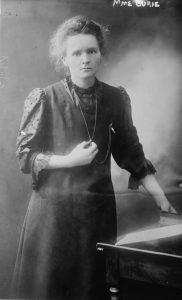Marie Curie:
Defining Her World Through Science
Winning The Nobel Prize
The world of science so admired the Curies, they were granted a very high honor: The Nobel Prize. The Curies were granted the Nobel Prize for contributions to science. They shared this prize with Henri Becquerel, who also received a Nobel Prize. “Together with her husband, she was awarded half of the Nobel Prize for physics in 1903, for their study into the spontaneous radiation discovered by Becquerel, who was awarded the other half of the Prize” (“Nobel Lectures, Physics 1901-1921” [The Nobel Prize Organization]). Marie went on to win a second Nobel Prize. Marie’s work with Pierre set the stage for worldwide recognition of their devotion, and then for a second acknowledgement “In 1911 she received a second Nobel Prize, this time in chemistry, in recognition of her work in radioactivity” (Ibid). This made her the only person to ever hold Nobel Prizes in two different sciences- physics and chemistry. This caused the Curies to be even more celebrated as Marie continued to change the status quo and call out the need for a reformation of social barriers.

("Marie Curie Standing With Necklace" Library of Congress, ca. 1921)